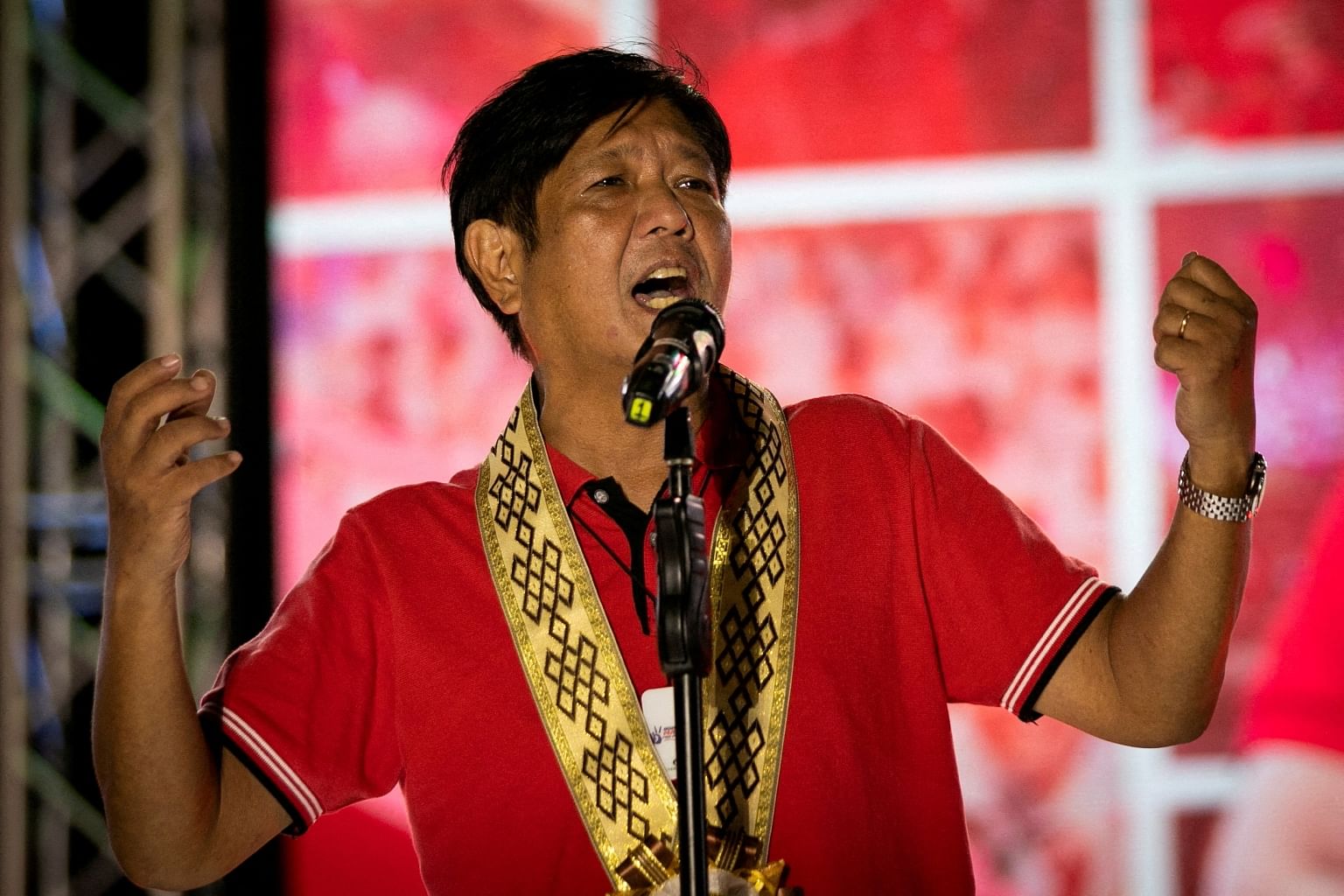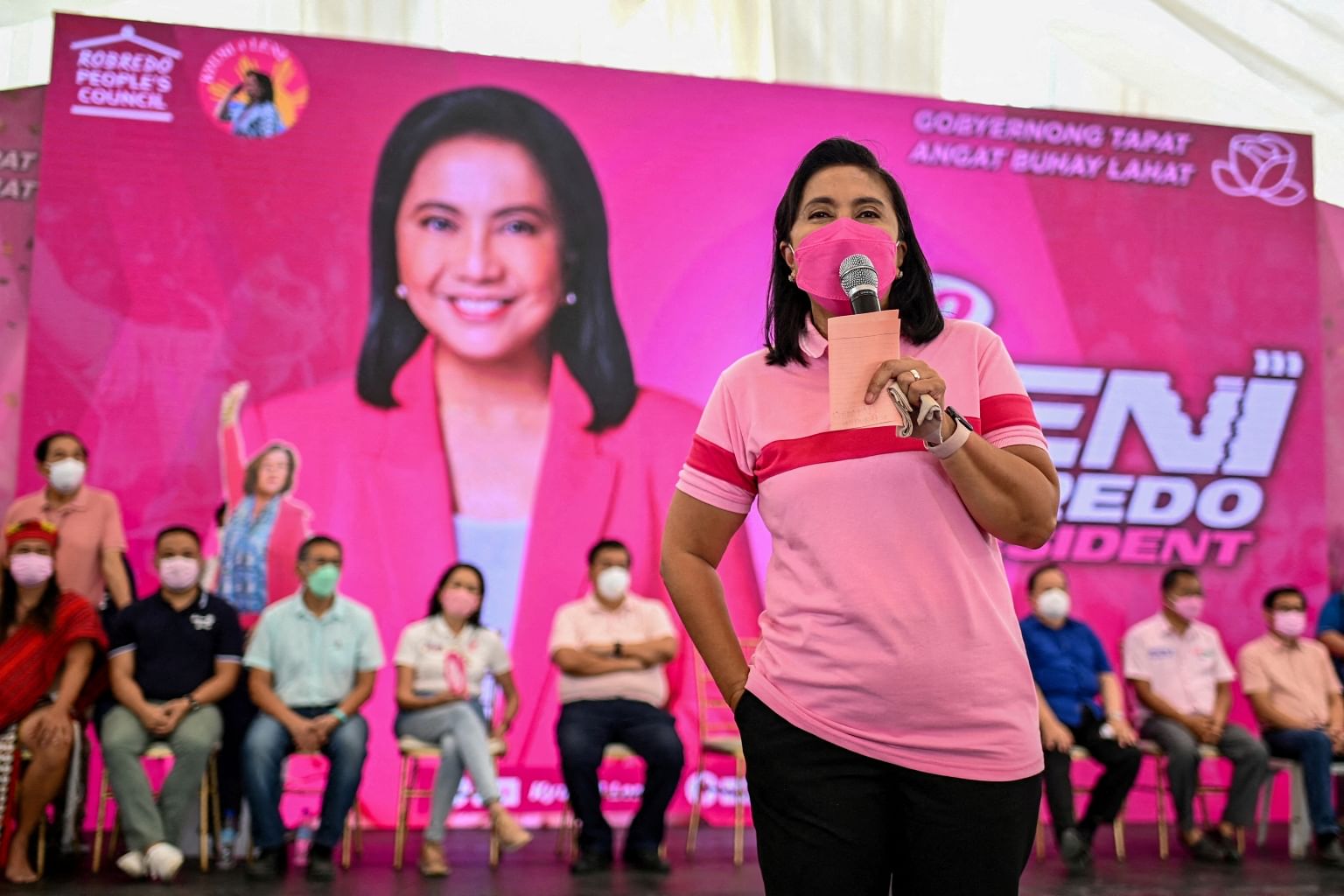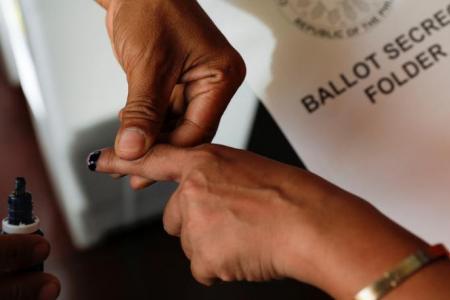A guide to the Philippines election
MANILA (REUTERS) - Voting started in the Philippines on Monday (May 9) to decide thousands of positions across the archipelago, including who will take over from Mr Rodrigo Duterte and become its president for the next six years.
Here is a rundown of what to expect:
What's being decided?
The election will choose a president, vice president, 12 senators, 300 lower house legislators, and about 18,000 officials across 7,600 islands, including mayors, governors and their deputies.
About 67.5 million of the South-east Asian nation's 110 million population are eligible voters and most ballots will be cast on election day, with polls open from 6am to 7pm.
Each voter must select one candidate for each post, from president, vice-president and senate, all the way down to their local district councillors. Winners serve three-year terms, except for the president, vice president and senators, who serve six years.
Who are the presidential contenders?
Mr Ferdinand Marcos Jr, 64, the son and namesake of the dictator overthrown in a 1986 "people power" uprising, has been the clear leader in all opinion polls this year.
A former governor, congressman and senator, Mr Marcos Jr is a political heavyweight from a family with deep pockets and powerful connections. Critics say him winning the presidency is the Marcos family's endgame in whitewashing its past and changing narratives of authoritarianism, plunder and opulent living.
Mr Marcos Jr's campaign message is unity and during recent interviews has been unabashed in praising his late father for his "genius" and leadership.
His closest rival is Mrs Leni Robredo, 57, who beat Mr Marcos Jr in the 2016 vice-presidential election. Mrs Robredo is a former human rights lawyer and staunch liberal who as vice-president led campaigns against poverty and gender inequality.
She entered politics in 2013 after the death in a plane crash of her husband, a former interior minister.
Other candidates include Manila mayor Francisco "Isko Moreno" Domagoso, retired boxing champion Manny Pacquiao and Panfilo Lacson, a former police chief, although they have consistently trailed in polls.
Are Philippine elections credible?

Although vote-buying, political violence and occasional glitches with electronic voting machines have been problems in the Philippines, fraud on the level that would cast doubt on the credibility of polls or their outcome is very unlikely.
Independent poll monitor the Asian Network for Free Elections concluded that each of the most recent Philippines elections were generally free and fair, with turnout remaining high at about 80 per cent.
How important is the overseas ballot?
Millions of Filipinos have either settled or taken jobs overseas. They collectively remit tens of billions of dollars each year, helping sustain families and drive the Philippine economy.
As breadwinners, the 1.7 million registered overseas voters - and many more Filipinos holding other nationalities - can be key in influencing the voting choices of their families back home or their communities abroad.
When will winners be known?
Vote-counting starts after polls close and there can be a strong indication of who will be the new president within a few hours via a live, unofficial vote count.
The election commission is aiming to announce most of the winners by the end of May and those will soon after be confirmed by a proclamation of the current legislature.
The president-elect has seven weeks before being sworn in, during which time their transition team will work out policy plans and sound out potential cabinet members.
Does the vice-presidency matter?

The vice-president has no real power unless the president vacates office, but as election running mates, they can be crucial allies in rallying supporters behind presidential candidates.
Mr Marcos Jr has teamed up with current President Duterte's daughter, Ms Sara Duterte-Carpio. Her support in the south - historically a weak spot for the Marcos family - could be a game-changer. While her father has not endorsed Mr Marcos Jr, or any other candidate, he is almost certain to absorb some of the outgoing president's support.
The vice-president is elected in a separate contest and may not be an ally of whoever becomes president.
What about parties?
In the Philippines, political parties tend to be secondary to personalities, with loyalties shifting easily.
Family names and endorsements from celebrities, social media influencers and politicians carry enormous weight - far more than party affiliation.
Widespread defections are anticipated and lawmakers will often ally themselves with whoever becomes president, although rivalries and ideological differences will ensure a political opposition exists.
HOW WOULD EACH CANDIDATE RULE?
Mr Marcos Jr is unlikely to rule like his authoritarian father, although strongman-style leadership could be expected.
This approach proved popular under incumbent Duterte, who cultivated an image as a ruthless, no-nonsense leader who got things done.
If elected, Mr Marcos Jr would probably use his family’s influence to consolidate power through transfers, appointments and connections in the bureaucracy, judiciary and other key bodies, replacing potential obstacles with members of his extensive political network.
He could expect a more favourable congress and senate than Mrs Robredo.
A Robredo victory would bring a more liberal approach and focus on education, healthcare, poverty and gender equality, while strengthening institutions and oversight and boosting market competition.
She has pledged to improve social welfare, such as unemployment benefits and family support.
However, a Robredo presidency would probably run into turbulence. She has already been a prime target for hate and disinformation campaigns as a vice president who dared to challenge Duterte.
WHAT ABOUT THE ECONOMY?
Neither candidate will advocate a significant economic restructuring, though both have promised to prioritise pandemic recovery and could target investment reforms, such as cutting red tape.
Mrs Robredo has pledged to increase investment to tackle climate change, level the playing field for business and promote public-private partnerships.
Mr Marcos Jr has revealed very little about policy and has steered clear of presidential debates and tricky media interviews, focusing on a simple but ambiguous message of unity. Continuity with Mr Duterte is expected, for example on key infrastructure projects.
Some economic risk consultants have seen a higher chance of corruption and nepotism under a Marcos presidency, however, and the scope for score-settling and retaliation against businesses linked to the family’s opponents.
WHAT WOULD FOREIGN POLICY LOOK LIKE?
The Philippines’ longstanding ties to former colonial power the United States are unlikely to be threatened by either candidate, having been steady through Mr Duterte’s years of very public hostility towards Washington.
The defence alliance is crucial for internal security and military capability, and preserving it is vital for a Philippine president’s relationship with the armed forces.
Mr Marcos Jr is seen as the candidate closer to China and could benefit from its business interests. He favours a two-way approach that better suits Beijing but will frustrate advocates of the multilateral approach Mrs Robredo is likely to pursue.
Mr Marcos Jr has been pragmatic in recognising the Philippines is no match militarily, so a tough stance should not be expected.
Mrs Robredo would oppose Chinese provocations, and remind Beijing that an international arbitral court ruling in 2016 invalidated most of its South China Sea claims.
WHAT HAS BEEN DUTERTE’S ROLE?
Mr Duterte has had a testy relationship with Mrs Robredo but has been characteristically mercurial over Mr Marcos Jr, having both praised him and questioned his suitability to lead.
Mr Duterte has not endorsed Mr Marcos Jr, or any other candidate, but crucially he has not sought to move against him or hurt his reputation.
A big win for Mr Marcos Jr was securing the president’s daughter, Sara Duterte-Carpio, as his vice-presidential running mate, helping him to absorb some of the incumbent’s cult-like following, particularly on social media, and draw new voters.
The dynamic of the two families has spurred speculation of a quid pro quo that helped secure the presidency for Mr Duterte, who in turn smoothed the way for Mr Marcos Jr.
Notable was Mr Duterte publicly thanking politician and Mr Marcos Jr’s sister, Imee, for funding his campaign – which she later dismissed as a joke. He also occasionally praised the late dictator and controversially allowed his body to be moved to a "heroes" cemetery in Manila, after years of failed attempts by the family.
HOW IMPORTANT IS SUCCESSION FOR DUTERTE?
Political vendettas are common in the Philippines and former presidents often face legal action or are even jailed. Mr Duterte has made a few enemies.
Though they left no dent on his popularity, Mr Duterte’s presidency was fraught with scandals involving allies or appointees, some of which could re-emerge later.
Activists and lawyer groups blame Mr Duterte for thousands of alleged executions of drug pushers and users during his war on drugs and could launch legal action when he leaves office, or lobby the International Criminal Court to resume investigation.
Mrs Robredo has been a staunch critic of the president’s lethal methods of fighting drugs and crime and would be more likely to enable investigations into Mr Duterte.
But with his daughter as vice-president and Mr Marcos Jr in charge, he would be well insulated.
Get The New Paper on your phone with the free TNP app. Download from the Apple App Store or Google Play Store now


